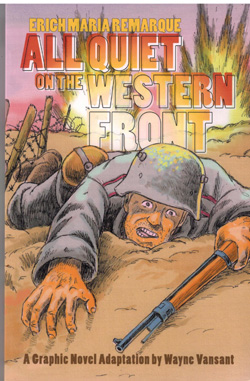All Quiet on the Western Front by Erich Maria Remarque; graphic adaptation by Wayne Vansant, © 2019 published by Dead Reckoning, ISBN9781682-474601, 170 pages, $24.95.
By Donald H. Harrison

 SAN DIEGO – If I suddenly had universal authority, I would order every world leader, every man or woman capable of summoning an army to fight for a cause, to read this book, either in the original that was published shortly after World War I, or in this modern graphic version. It tells a story so compelling, so necessary, about the human costs of war, that those leaders might, at least, think twice before ordering young men to lay down their lives amid the gore and senselessness of battle.
SAN DIEGO – If I suddenly had universal authority, I would order every world leader, every man or woman capable of summoning an army to fight for a cause, to read this book, either in the original that was published shortly after World War I, or in this modern graphic version. It tells a story so compelling, so necessary, about the human costs of war, that those leaders might, at least, think twice before ordering young men to lay down their lives amid the gore and senselessness of battle.
Yes, we honor our fallen warriors on Memorial Day, and well we should, because they fought earnestly and bravely, and there are times when rapacious murderers like Hitler must be stopped.
Perhaps just as earnest and brave as our soldiers were the soldiers of our enemies in various wars, who also died even though their lives counted for little in the calculus of national objectives, prestige, and power. Some of the opposing warriors believed in their missions, others did what they were told, and still others were killed before they really had time to think about it – and for what, for what, were these men and women sacrificed? Could not the leaders of warring countries have found some other way to settle their differences? Was the carnage and the mayhem absolutely necessary?
In All Quiet on the Western Front, we follow a platoon of German soldiers, all of whom came from the same town. We watch them, under the influence of propaganda and war fever, march off to be trained. A corporal who in civilian life would be insignificant in their lives suddenly has the power to sadistically lord it over them. One night as he is walking alone, they have their revenge. They throw a sack over him and beat him. But no such victories can be won against nameless enemies who have greater fire power than you do. All you can do is follow orders, charge forward for a few yards, fall back, dive into foxholes, carry out the dead and the wounded, charge again, cover yourself when the bombs fall, observe in horror as comrades have body parts blown off them—arms, legs, even heads – in a cacophony of bleeding, gasping, and dying, and then keep following orders to charge, shoot, take cover, again and again.
The young men who become soldiers know more about death than they do about life. They have seen it come in many forms – bullets, bombs, gas, flames, sickness – and when, at last, they go home on a brief furlough, no one understands how traumatized they are. Did you see action? What’s it like on the front? Did you engage in hand-to-hand combat? A soldier does not want to talk of such things, not to those who haven’t seen it, experienced it, or hardened themselves to it.
Yes, there are moments of relief; some members of the German platoon spot some French girls across the river, and at night, holding bread and other foodstuffs aloft, they swim on their backs to the far shore, where they trade food for sexual favors. Meaningless as the sex may seem, it comes as a respite – in the midst of death, destruction, and putrefaction, they can, at least go through the motions of love making and creating new life. But this reaffirmation of life may well be futile; on the very next day bombs might fall on the soldiers, or on the villagers.
Wounded members of the platoon are taken behind the lines to hospitals, where the dead are quickly replaced by the dying. There is kindness in the hospital, but what does it matter in the scheme of things? Those that don’t survive are carted away; those that do are marched away, back to the front lines.
We watch as the friends one by one meet pointless deaths. Even as an armistice is being discussed, opposing soldiers frantically kill one another to avoid being killed.
No wonder Hitler banned All Quiet on the Western Front in its book and movie versions as soon as he came to power. No dictator bent on world power would dare let such awful truth be known.
*
Harrison is editor of San Diego Jewish World. He may be contacted via donald.harrison@sdjewishworld.com